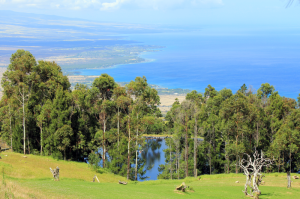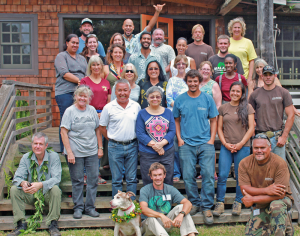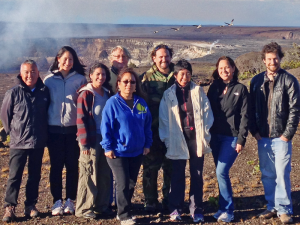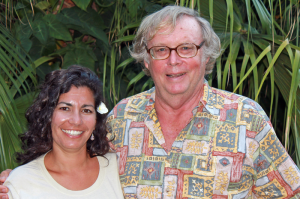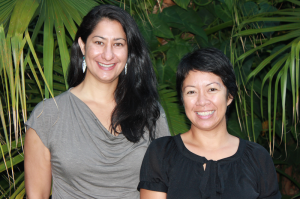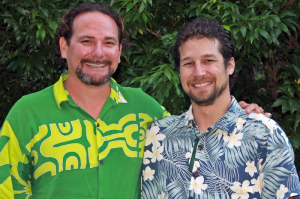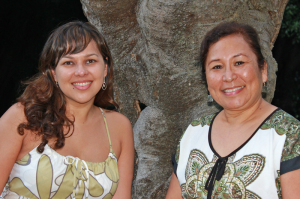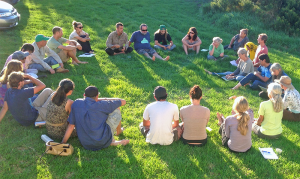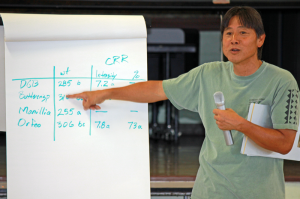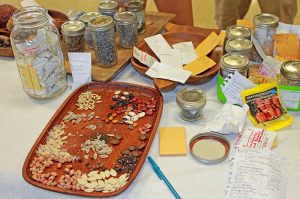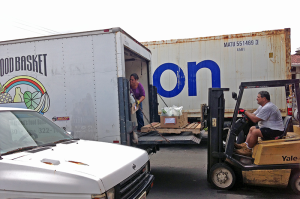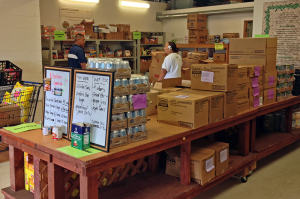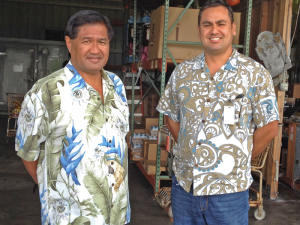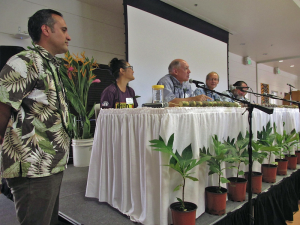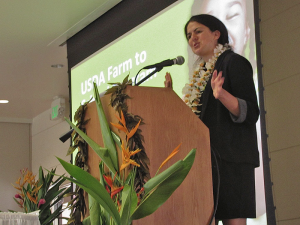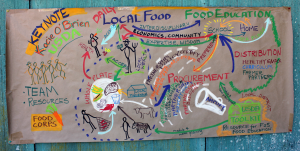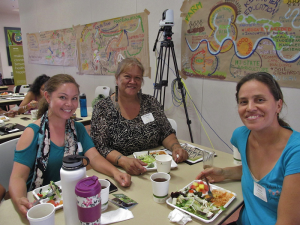A landmark gift, a convergence of vision
Early this summer, Hawai‘i Island resident James Posner presented us with an extraordinary and unexpected gift: a spectacular 60-acre ranch on Kohala Mountain. Through his generosity, he joins The Kohala Center’s founding benefactor, Dr. Earl Bakken, and more than 700 volunteers, 300 donors, and board members and staff in working toward a more abundant, sustainable, creative, and compassionate future—for Hawai‘i and the world.
- The 60-acre campus features a reservoir, water purification and photovoltaic systems, and stunning views of the Kohala Coast.
“The spirit of this gift represents a convergence of vision from the ancient and recent past onward into the future, outward to the world at large, and beyond what we imagine today,” Posner said. “Over the last fifteen years they have demonstrated excellence in accomplishment, integrity, and creativity in service to Hawai‘i’s communities in an inclusive manner.”
The 60-acre ranch is being given to us in two separate parcels: the first 40-acre parcel was transferred in mid-June; the second 20-acre parcel will be transferred by next summer. We hope to begin moving our research, educational, and conservation programs to the campus in the second half of 2015.
Posner has spent his eight-year tenure at the ranch building on the work of previous owners Wally and Wendy Campbell, preserving and enhancing its natural beauty and creating a self-sufficient, mixed-use facility. “I wanted the land to be a productive and welcoming place for the purposes of conservation, propagation, education, expression, and communion,” he said. “The Kohala Center is ideally suited to steward the ranch to the next level.”
Our future campus will enable us to strengthen our programs, which respectfully engage the island of Hawai‘i as a model of and for the world through efforts in the fields of energy self-reliance, food self-reliance, and ecosystem health.
The land itself is breathtaking and serves as a fitting reminder of why we engage in the mission-driven work that we do. When it rains at the ranch, streams flow, ponds fill, and waterfalls spill over gorges, as native plants flourish and birds fly among thousands of trees. On crisp mountain days, Maui and Kaho‘olawe appear across the deep blue ‘Alenuihāhā Channel as clouds spiral toward the heavens. We aspire for the new campus to be a serene, yet energized, gathering place for public, private, and independent sector leaders, scientists, community organizers, humanists, performing artists, fine artists, and peacemakers—all imagining and inspiring thoughtful and creative ways to enhance Hawai‘i’s and the world’s well-being.
- Donor Jim Posner (bottom left) and his faithful dog and ranch guardian, Miss Piggy, welcomed our staff on a recent visit to the new campus.
“The property’s awe-inspiring beauty and serene setting, high elevation, and spectacular views of the Kohala coastline and Haleakalā physically manifest the soaring aspirations of Hawai‘i’s communities,” says Roberta F. Chu, senior vice president and manager at Bank of Hawaii and chair of our board of directors. “This gift has already invigorated The Center’s staff to continue to push hard for excellence in service of those aspirations.”
One of our board members, the Reverend Puanani Burgess, a noted poet, peacemaker, and community organizer, believes that “a gift of this magnitude and with such good intent will have ripple effects across our entire island planet.”
We look forward to sharing more news about our new campus, and photos of our progress, in future issues of The Leaflet. Mahalo nui loa for your continued support of our research, our programs, and our dedication to improve the well-being of Hawai‘i’s communities.
New Mellon-Hawai‘i Fellows address critical contemporary issues
Now in its seventh year, the Mellon-Hawaiʻi Doctoral and Postdoctoral Fellowship Program welcomes four new fellows to today’s generation of Kānaka Maoli (Native Hawaiian) intellectual leaders. Through their dissertations and manuscripts, this year’s cohort is focused on some of the most important issues facing island communities today.
The Andrew W. Mellon Foundation and The Kohala Center, with the support of Kamehameha Schools, established the Mellon-Hawaiʻi Doctoral and Postdoctoral Fellowship Program in 2008. Administered by The Kohala Center, the program recognizes and supports the work of Native Hawaiian academics early in their careers, and others who are committed to the advancement of knowledge about the Hawaiian natural and cultural environment, Hawaiian history, politics, and society.
- The seventh cohort of Mellon-Hawai‘i Fellows convened with a sunrise ceremony at Halema‘uma‘u Crater on July 18, 2014. As the fellows and their mentors gathered for this photo, a flock of endangered nēnē (Hawaiian geese) soared overhead. From left to right, Matthews Hamabata, Ph.D., Liza Keānuenueokalani Williams, Noelani Puniwai, Craig Severance, Ph.D., Keiki Kawai‘ae‘a, Ph.D., Kamanamaikalani Beamer, Ph.D., Vernadette Vicuna Gonzalez, Ph.D., Rebecca ‘Ilima Luning, Ph.D., Noa Kekuewa Lincoln, Ph.D.
The program provides a stipend and mentoring to enable doctoral fellows to complete their dissertations before accepting their first academic posts, and postdoctoral fellows the opportunity to publish original research early in their academic careers. Of the 24 scholars who have completed the program as of June 30, 2014, seven are tenured and an additional eight are in tenure-track positions in the University of Hawai‘i system, and one has an appointment as a research fellow at Oxford University in England.
The 2014-2015 cohort includes doctoral fellow Noelani Puniwai, Ph.D. candidate in the Natural Resources and Environmental Management program at the University of Hawaiʻi at Mānoa; doctoral fellow Liza Keānuenueokalani Williams, Ph.D. candidate in the American Studies department at New York University; postdoctoral fellow Dr. Noa Kekuewa Lincoln, who obtained his Ph.D. in interdisciplinary environmental research from Stanford University in 2013; and postdoctoral fellow Dr. Rebecca ‘Ilima Luning, who earned her Ph.D. in developmental psychology from the University of Hawai‘i at Mānoa in 2013.
“Over the years we have been impressed by the thoughtfulness and relevance of the topics that the Mellon-Hawai‘i Fellows have chosen to engage in their advanced studies and academic publishing,” said Dr. Matthews M. Hamabata, president and chief executive office of The Kohala Center. “The seventh cohort is certainly no exception. In covering issues such as contemporary Hawaiian pedagogy, land and natural resource management, and the commodification of Native Hawaiian culture, land, and people, this year’s fellows are addressing some of the most critical topics in Hawai‘i today. They, and the fellows before them, are Hawai‘i’s emerging intellectual leaders who will help chart a course for our islands’ future.”
- (l-r) Mellon-Hawai’i doctoral fellow Noelani Puniwai, mentor Craig Severance, Ph.D.
In her dissertation, Puniwai will evaluate how and why different ocean user groups socially construct and delineate marine space much in the way that coastal areas are ecologically delineated through definitions of functional space. “We must view the sea as a cultural space, otherwise we risk returning to the past, to a time when the biological resources of the sea seemed endless and an open resource,” she said. “We must ‘own’ our responsibility to the future of the ocean or we will have only ourselves to blame for its demise. I believe the only true course of action to protect and sustain our oceans is through people: by acknowledging their knowledge and their actions in order to benefit our collective future. I hope my work will benefit the community by engaging ocean users in natural resource management and sustaining our relationship with the ocean for generations.” Puniwai is being mentored by Dr. Craig Severance, professor emeritus in anthropology at the University of Hawai‘i at Hilo.
- (l-r) Mellon-Hawai‘i doctoral fellow Liza Keānuenueokalani Williams, mentor Vernadette Vicuna Gonzalez, Ph.D.
Williams’ interdisciplinary research focuses on the historical and contemporary trajectories of colonialism in Hawaiʻi and its shifting relationship with the United States through the commodification of Native Hawaiian culture, land, and people. Working with mentor Dr. Vernadette Vicuña Gonzalez in the Department of American Studies at the University of Hawaiʻi at Mānoa, Williams’ research uses ethnography, textual analysis, and archival methods to focus specifically on the capitalist-colonial histories of Hawaiʻi and their impacts on contemporary cultural politics for Native Hawaiians through three major industries: tourism, the military, and the prison industrial complex. “Having few resources at home while growing up, yet having access to more than adequate resources as a student at Kamehameha Schools, helped me see and understand how our community is often divided by social constructs that have ties to our colonial histories, and how those constructs and histories significantly influence us,” Williams said. “I chose to study these three industries because each of them has touched my life, touched my family, and touched the lives of many Native Hawaiians in very powerful ways. I feel that these three industries all have profound impacts on Maoli past and present, and implications for our future. They shape our daily experiences and provide both limitation and opportunity for many of our people. Exploring and making sense of these tensions is the crux of my work, as well as a desire to understand how we may carve a path for ourselves toward the future.”
- (l-r) Mentor Kamanamaikalani Beamer, Ph.D., Mellon-Hawai‘i postdoctoral fellow Noa Kekuewa Lincoln, Ph.D.
Lincoln’s postdoctoral research examines combining traditional and modern land management knowledge to evaluate corporate and policy decisions from a basis of social utility rather than an economic one. Focusing on the highly ecologically diverse landscape of Kona on Hawai‘i Island, his work brings together multiple disciplines as well as traditional and scientific knowledge to understand the productive capacity of Hawaiian agriculture. “I’ve catalogued and examined the vast array of farming styles and systems that were operated in Kona, and begun to document their productivity and sustainability,” Lincoln said. “Hawai‘i Island supported more people in traditional times than it does today, and without food and fertilizer inputs into the system. While it’s unlikely we could replicate this today, either technologically or socially, examining the highly efficient and productive methods of the past can certainly guide our future.” The work being supported by his postdoctoral fellowship will support the completion of his second book on Hawaiian ethnobotany and inform future articles on how Hawaiian farming techniques were uniquely adapted. Lincoln is being mentored by Dr. Kamanamaikalani Beamer, assistant professor in the Hui ‘Āina Momona program with a joint appointment between the Hawai‘inuiākea School of Hawaiian Knowledge and Richardson School of Law at the University of Hawai‘i at Mānoa; Beamer himself was a Mellon-Hawai‘i postdoctoral fellow in the program’s inaugural cohort.
- (l-r) Mellon-Hawai‘i postdoctoral fellow Rebecca ‘Ilima Luning, Ph.D., mentor Keiki Kawai‘ae‘a, Ph.D.
As a cultural and educational specialist in the department of educational psychology at the University of Hawai‘i at Mānoa, and the project coordinator of the Mōhala Nā Pua program at the University’s Center for Research on Education, Diversity, and Excellence, Luning is interested in furthering the understanding of a Hawaiian ethnotheory of learning. “The focus of my researchis to examine the cultural goals, values, and purposes of learning in a modern Hawaiian context,” she said. “The articles I intend to publish will focus on the similarities and differences between various Hawaiian cultural practitioners’ and classroom educators’ teaching strategies and philosophies, their purposes and goals for teaching in and through the Hawaiian culture, their emphasis on developing a Hawaiian consciousness and cultural worldview in their students, and their definitions of success for their haumāna (students). My hope is that my research will also assist educational leaders in creating policy to support the use of culture and traditional teaching strategies in the classroom, be of value in influencing Hawai‘i’s educational system, and ultimately empower our youth and contribute in some small way to raising Hawaiian consciousness.” Luning is working with mentor Dr. Keiki Kawai‘ae‘a, director of the Ka Haka ‘Ula O Ke‘elikōlani College of Hawaiian Language at the University of Hawai‘i at Hilo.
Each cohort is selected and convened annually by a distinguished panel of senior scholars and kūpuna (esteemed elders):
- Panel Chair, Robert Lindsey, Jr., Member, Board of Directors, The Kohala Center; and Trustee, Office of Hawaiian Affairs
- Panel Executive Advisor, Dr. Shawn Kana‘iaupuni, Director, Public Education Support Division, Kamehameha Schools
- Dr. Dennis Gonsalves, founding Executive Director, Pacific Basin Agricultural Research Center; and Professor Emeritus, Cornell University
- Dr. Pualani Kanahele, Distinguished Professor, Hawai‘i Community College and member, Board of Directors, the Edith Kanaka‘ole Foundation
- Dr. James Kauahikaua, Scientist-in-Charge, U.S. Geological Survey Hawaiian Volcano Observatory
Applications are now being accepted for the 2015-2016 Mellon-Hawai‘i Doctoral and Postdoctoral Fellowship Program. Application materials and more information about the program are available online at MellonHawaii.org or by calling The Kohala Center at 808-887-6411. The deadline to apply is February 27, 2015.
Planting the seeds of success
In 2010, the Food and Agriculture Organization of the United Nations reported that the world lost an estimated 75% of its crop diversity during the 20th century. With the increasing effects of climate change, the anticipated continued decline in biodiversity will pose a serious threat to global seed availability and food systems. In an effort to reverse this trend and improve local food security, the Hawai‘i Public Seed Initiative is working with scientists, educators, farmers, and consumers across the state to promote seed freedom by empowering island networks, hosting community seed exchanges, and increasing local support for biodiversity.
Spearheaded by Hawai‘i Island School Garden Network director Nancy Redfeather and coordinated by Lyn Howe, the Hawai‘i Public Seed Initiative was launched in 2010 after Hawai‘i seed savers identified the need for a concerted effort to develop reliable sources of locally grown and adapted seed. In its first eighteen months, the Initiative hosted basic seed-saving workshops on Hawai‘i Island, Maui, Kaua‘i, Moloka‘i, and O‘ahu with the support of University of Hawai‘i College of Tropical Agriculture and Human Resources extension agents Glenn Teves (Moloka‘i), Russell Nagata (Hawai‘i Island), and Hector Valenzuela (O‘ahu).
“We were excited to have educated more than 180 people on five islands about seed production and saving, and to have opened doors to numerous resources available to them,” Howe said. “These workshops helped to organize and raise awareness of the importance of growing seed that is locally adapted to our many microclimates, as well as the work ahead for the seed movement in Hawai‘i”
- Participants in the second annual statewide Seed Network Gathering reflect after a day of farm visits and seed demonstrations in Waimea, Hawai‘i Island.
The workshops also helped to identify committed seed leaders from each island, who were then invited to the Initiative’s first Statewide Network Gathering in 2013. After a weekend of training, strategizing, and team-building, participants agreed that offering mini-grants to network members to pursue specific seed projects would benefit their respective islands and communities, and the statewide movement as a whole. Fast forward to this past August when a second Statewide Network Gathering was convened in Waimea on Hawai‘i Island, during which last year’s attendees shared the results from their individual seed projects, gave updates about progress on their respective islands, and gathered more support and momentum from the Initiative and each other.
The mini-grant-funded projects included seed variety trials, community seed exchanges, educational workshops, and seed-lending libraries, resulting in increased seed awareness and outreach statewide. According to Howe, “We welcomed new individuals with strong seed knowledge into the Network, and shared and learned a lot from each other. There is more excitement around this growing movement as people begin to see how and why they can and should become more involved in it. I feel as though we made a quantum leap forward on many levels.”
The 2014 Network Gathering also featured an inter-island seed exchange and inspirational tours of South Kohala farms such as Milk and Honey Farm, Squash and Awe, and Robb Farms. Cultivating new relationships and sharing experiences also proved to be valuable parts of the weekend. “Sharing stories and seeds is vital for a strong, sustainable community,” said Donna Mitts, Hawai‘i Island School Garden Network coordinator, who is also a farmer and active seed saver. “When committed and passionate folks come together to share sustainable food production knowledge, we all need to focus our energies on listening to and learning from each other.”
The Hawai‘i Public Seed Initiative also works to advance biodiversity in the state through community seed exchanges, at which community members share seeds they’ve harvested, learn proper seed exchange protocols, and are reminded of the importance of checking for invasive species such as coqui frogs and little fire ants when transporting and receiving plant materials. Howe has coordinated several “Seedy Saturdays” on Hawai‘i Island, with the most recent one held in Honoka‘a on August 31 in partnership with the Honoka‘a High School Agricultural Program. More than 60 community members came out to exchange seeds, enjoy a community potluck, and share knowledge and experiences, as well as attend an informative presentation by Dr. Russell Nagata on how to maintain varietal purity, select for desired traits, and design and run variety trials.
- Dr. Russell Nagata, extension agent with the University of Hawai‘i College of Tropical Agriculture and Human Resources, delivers a presentation about seed variety trials during the Honoka‘a Seed Exchange held on August 30, 2014.
“Seed trials are valuable because they help farmers, and even backyard gardeners, determine what varieties work best on their land,” Nagata said. “Formal trials involve keeping track of much more than what grows well and what doesn’t: you also want to record when you planted, when you harvested, what plot or field you grew it in, the seasons in which they performed best. Your data will not only help you plan better for the future, but will help fellow growers producing in your same climate zones under similar conditions.”
The Hawai‘i Public Seed Initiative is in the final stages of developing an online “Seed Variety Selection Tool for the Hawaiian Islands” in collaboration with The Kohala Center’s communications team and mini-grant recipient Ilana Stout. This interactive tool, scheduled to launch by the end of the year, will allow users to search data submitted by experienced Hawai‘i growers to determine which varieties of common crops, such as tomatoes, lettuce, taro, eggplant, beans, and squash, perform best in their specific climate zones.
Zoe Kosmas, farm production assistant with The Kohala Center’s Beginning Farmer-Rancher Development Program, assisted Howe in organizing the Honoka‘a Seed Exchange along with other Hāmākua-area farmers. “If we want to have reliable plant varieties that perform well in Hawai‘i, our farmers and gardeners need to feel empowered to save their own seeds from healthy, vigorous plants native or adapted to our diverse environments,” Kosmas said. “With natural and industrial factors impacting crop performance worldwide, depending on seeds that are shipped from around the world is risky. These seed exchanges and educational programs not only further Hawai‘i’s potential to be more food self-reliant, they can help foster a stronger sense of pride, community, and determination.”
- A variety of seeds on display at the Honoka‘a Seed Exchange.
“There’s never been a more crucial time to increase awareness around seeds and seed saving,” agreed Marielle Hampton, a farmer with the Hāmākua Agricultural Cooperative and Seed Network member who also helped to organize the event. “Not just locally, but worldwide.”
Seed exchanges also contribute a more personal, human element to food production.Anna Peach, owner of Squash and Awe Farm in Waimea, noted that when she plants seeds given to her by other growers, she doesn’t just think about what will grow from them. “When I push those seeds into the soil, I see the faces of the people who took the time and care to harvest, clean, package, and pass them on to me,” she said. “The writing on the packets, the notations made for care, the experiences shared and best wishes for success all contribute to the growing experience, the sense of community, and hope for the future.”
The Hawai‘i Public Seed Initiative’s next Seedy Saturday will be held on Saturday, November 8 from 2–6 p.m. at the University of Hawai‘i at Hilo. The event, billed as “SUPER Seedy Saturday,” will also include an exclusive advance screening of the feature film Open Sesame—The Story of Seeds and an interactive panel discussion. For more information, visit https://kohalacenter.org/event/first-annual-super-seedy-saturday or email seedproject@kohalacenter.org.
The Food Basket launches fresh local food program for low-income island residents
The Food Basket, Hawai‘i Island’s food bank, received assistance from The Kohala Center to help launch a project aimed at providing low-income island residents with greater access to fresh, healthy, locally grown food. The project uses a community supported agricultural (CSA) model to deliver produce boxes to qualifying individuals, families, and seniors, with a goal of serving 2,000 customers by March 2015.
- Staff members of The Food Basket load up a delivery truck. The agency delivers CSA boxes and ingredients to food pantries, soup kitchens, and customers in 17 communities around Hawai‘i Island.
The Kohala Center’s Rural and Cooperative Business Development Services (formerly the Laulima Center) team provided grant writing assistance to help The Food Basket secure more than $220,000 in funding from the U.S. Department of Agriculture and the Wallace Center at Winrock International to create and administer the Ho‘olaha ka hua (“Propagating fruit”) Food Hub program. Expanding on The Food Basket’s existing Senior Farmers Market Nutrition Program, which provides CSA produce boxes to more than 1,500 individuals, Ho‘olaha ka hua will provide Hawai‘i Island residents who receive federal Supplemental Nutrition and Assistance Program (SNAP) benefits with an affordable option to incorporate healthy, locally produced foods into their diets. The program also seeks to increase the health literacy of all of its CSA customers, provide local farmers with additional opportunities to sell their produce, and develop a self-sustaining food hub for the island.
WATCH: Ho‘olaha ka hua videos
» Healthy, Local Food for You!
» Attention All Farmers!
The produce boxes for low-income customers, which cost $10 each, are subsidized in part by a retail-level CSA program which offers produce boxes for $15-17 each to island residents who don’t receive SNAP benefits. Despite the lower cost for SNAP-eligible customers, participants in both programs receive identical offerings in their produce boxes. “We believe in offering all of our customers, be they low-income or otherwise, the same varieties of fresh, high-quality local food,” said En Young, executive director of The Food Basket. “There aren’t different ‘thems’ here. SNAP customers don’t receive boxes full of lesser-quality produce just because they pay less. We as a society need to blur the lines and start remembering who ‘other’ people are: they’re people.”
- The Food Basket’s Hilo pantry. The agency serves more than 7,000 customers on Hawai‘i Island every month from warehouses in Hilo and Kailua-Kona with the help of more than 70 partner agencies.
The Food Basket’s mission is to feed Hawai‘i Island’s hungry while also addressing the root causes of the critical social problem of hunger. Founded in 1989 under the auspices of the Catholic Diocese and spun off as an independent nonprofit organization in 2007, The Food Basket has consistently emphasized how feeding those who are food insecure can empower them to meet life’s challenges with strength and dignity. The Food Basket currently serves 7,000 individuals per month from warehouses in Hilo and Kailua-Kona, distributing food over a 4,028-square-mile area with the assistance of more than 70 local partner agencies. In 2013 alone the organization helped to feed 175,000 individuals with two million pounds of donated and purchased frozen, fresh, and dry food. The organization receives nearly 80% of its revenue from private donations from island residents.
Through Ho‘olaha ka hua, The Food Basket intends to go deeper than just feeding the hungry: the development of a self-sustaining food hub could have positive impacts on the island’s poverty rate, incidences of diet-related illnesses, and agricultural economy. Creating access to healthy food while also expanding market opportunities for local farmers holds great potential to improve health and prosperity throughout the island. It also provides a unique opportunity for smaller farms that can’t traditionally produce the volume that other distributors require: by creating a food hub processing center, The Food Basket assumes responsibility for and aggregates produce, re-distributing it as a unified product and thus not requiring farms to label and brand all their produce individually.
Ho‘olaha ka hua represents a partnership between The Food Basket and The Kohala Center; the Agribusiness Incubator Program at the University of Hawai‘i, which will assist with the development of a business and marketing plan; the County of Hawai‘i, which works closely with The Food Basket to implement programs for the island’s low-income populations as well as provide physical infrastructure, volunteer labor, and business development assistance; the Hawai‘i State Department of Health, which through its “Live Better Together Collaborative” promotes consumption of fresh fruits and vegetables to SNAP recipients; and HOPE Services Hawai‘i, which will help to identify and assist eligible individuals through the SNAP application process.
- The Food Basket’s Marshall Akamu (left), operations manager for North and West Hawai‘i, and executive director En Young at the organization’s warehouse in Kailua-Kona. (Photo courtesy The Food Basket)
In addition to providing grant writing assistance, the Kohala Center is also helping to funnel young farmers and food producers into the program, as well as facilitating evaluation of the program. The Center’s chief operating officer, Dr. Elizabeth Cole, will serve as the lead evaluator, working with The Food Basket’s project director, Claudia Wilcox, to develop evaluation tools and processes to gauge the program’s effectiveness, impacts, and outcomes. “The Kohala Center will bring an objective voice to our work, as well as validated evaluation tools based on sound methods and experience,” Young said. “By evaluating us from the outside, they’ll help keep us accountable in that we won’t be evaluating ourselves. All of our partners will bring different areas of competence and expertise to Ho‘olaha ka hua, meaning that we at The Food Basket can focus on what we do best—program delivery—and do it even better.”
Community members interested in becoming subscribers in the Ho‘olaha ka hua community-supported agriculture program, as well as farmers interested in selling or donating produce to the program, are encouraged to contact The Food Basket at 808-933-6030. “Like” The Food Basket on Facebook for news and ‘ono recipes using ingredients found in weekly Ho‘olaha ka hua produce boxes.
Hawai‘i Farm to School Conference propagates ideas and action
In celebration of National Farm to School Month, a diverse audience of 175 food systems stakeholders from across the islands, including educators, farmers, and policymakers, gathered in Honolulu for the Hawai‘i Farm to School Conference on October 3, 2014 at Kamehameha Schools. Under the theme “Re-Growing Community Food Systems,” the conference was organized by the Hawai‘i Farm to School and School Garden Hui, a statewide program coordinated through The Kohala Center.
- Three panel discussions focused on the topics of “Farm,” “To,” and “School.”
The goal of the conference was to promote the knowledge and best practices needed to develop and sustain a statewide farm to school program to re-grow Hawai‘i’s agricultural economy, future farmers, and healthy schools and communities. The one-day conference featured three panels, each addressing key facets of food justice for all of Hawai‘i’s students: “Farm,” which examined agricultural challenges and opportunities for Hawai‘i’s farmers in their ability to expand local food production while restoring the environment and raising the next generation of farmers; “To,” which addressed connectivity between farms and schools for the sourcing of locally grown foods via processing, distribution, and procurement; and “School,” which featured educators and administrators from public, charter, and independent schools who have successfully incorporated garden-based education into their curricula and increased the consumption of fresh locally grown foods by their students.
Lydi Morgan Bernal, Hawai‘i Farm to School and School Garden Hui coordinator, opened the conference by emphasizing the importance of garden-based education and the spiritual and psychological impacts that nature has on children. Bernal outlined the Hui’s role in the state’s farm to school movement, articulated her vision for state-level support of garden-based and nutrition education programs, and stressed the need to make the availability of healthy, locally sourced food in school cafeterias a priority. She also proposed that the Hawai‘i Departments of Agriculture and Education create farm to school coordinator positions to advance these goals and facilitate the re-growing of community food systems statewide.
- Kacie O’Brien, U.S. Department of Agriculture Farm to School Western regional lead, delivered the conference’s keynote address.
The conference’s keynote speaker, U.S. Department of Agriculture Farm to School Western regional lead Kacie O’Brien, spoke of USDA’s support of farm to school programs and clarified federal procurement and food safety regulations. “Farm to School is possible, feasible, and encouraged,” O’Brien said. “In order to make it work, you need to think through the practical aspects, define your goals, and be prepared to move slowly. There is a lot you can do on your own in your school and community. Identify what can you work on right now, as well as the steps that will require more time and effort. Work on them both, and don’t get discouraged.” She invited attendees to take advantage of USDA’s Farm to School Toolkit to help schools and communities plan, build, and sustain such programs. O’Brien emphasized that regulations regarding farm safety and liability primarily exist on the state level, and encouraged attendees to work with local authorities to implement policy changes to increase the inflow of locally grown produce into schools.
The “Farm” panel addressed the importance of agriculture education and a return to ancestral abundance through community interconnectedness and agroecology. Speakers emphasized key concepts such as strength in interdependence, increasing consumer support for locally produced food, and community food hubs as a means to support local farm production. Panelist Ken Kakesako, deputy chairperson of the Hawai‘i Department of Agriculture, shared welcomed news that the department is ready and willing to host a farm to school program and coordinator position. He informed listeners that new food safety rules from the FDA will take effect next year, and expressed an overall willingness of the department to work in partnership with practitioners. Other panelists expressed a sense of urgency to improve public policy and farming methods to remedy Hawai‘i’s unsustainable dependencies on food imports and industrial agriculture. Glenn Teves, a Moloka‘i-based county extension agent for the University of Hawai‘i’s College of Tropical Agriculture and Human Resources, believes that farm to school programs can be powerful tools in connecting Hawai‘i’s schoolchildren back to traditional, ‘āina (land)-based values. “We need to teach our keiki (children) that agriculture should be part of their lifestyle,” he said. “It needs to be something they think about and engage with every day…[long-term food security] can only happen through cognitive influence on our youth. We can’t let bureaucracy stop us: if we don’t change and adapt now, we may not have a chance later.”
The next panel, “To,” focused on the needs and next steps for sourcing more locally grown food in schools, and the actions necessary to foster connections between farmers, distributors, and schools. State procurement administrator Sarah Allen pledged her support and encouraged farmers to organize in order to increase their capacity to maintain contracts with the state. Representatives from the Hawai‘i Department of Education’s School Food Services Branch, director Glenna Owens and supervisor Dexter Kishida, emphasized the need for collaboration and continuity, and noted that strict oversight is required to ensure food safety, protect students from potential illnesses, and the state from legal consequences. The development of community food hubs that take on food safety liability, support farmers through education and product transportation, and serve as processing centers, was again raised as a key step toward achieving a statewide farm to school program and re-growing our community food systems.
- Dr. Koh Ming Wei created posters of the presentations in real-time, allowing attendees to visualize and contemplate the day’s key takeaways.
Rounding out the discussions was the “School” panel, which featured representatives from public, charter, and independent schools who shared the impact that using school gardens as hands-on learning laboratories has had on student development, engagement with coursework, and academic performance. Hawai‘i Child Nutrition Programs representative Jennifer Dang emphasized the Hawai‘i Department of Education’s Wellness Policy as an important avenue for improving student health. Hawai‘i Department of Education complex area superintendent Ruth Silberstein demonstrated how a focus on sustainability, global citizenship, and project-based learning transformed student enthusiasm, confidence, and test scores at Pālolo Elementary School. Panelist Usha Kotner from Kona Pacific Public Charter School in Kealakekua highlighted her school’s implementation of a Universal School Breakfast program for all of its students, as well as its participation in the daily National School Lunch reimbursable program and the USDA Fresh Fruit and Vegetable Program. Kotner noted that “by working with local distributor Adaptations on Hawai‘i Island, we’re sourcing as much local and organic produce for snacks and meals as we can.”
Ecoliteracy educator Dr. Koh Ming Wei from Pacific Resources for Education and Learning provided a graphic “visualization” of the conference, sketching out the conversations as they unfolded onto large sheets of paper alongside the panels. The posters were then hung along a wall, allowing attendees to contemplate the ideas and concepts as they emerged throughout the day. Dr. Koh’s drawings helped to clarify and bring to life the key themes, players, and desired outcomes that will become part of the Hawai‘i Farm to School and School Garden Hui’s conference report and roadmap.
- Conference attendees enjoyed a “model school lunch” made with fresh, local ingredients that could be served in Hawai‘i’s public schools.
Conference attendees were treated to an “‘ono and pono” breakfast, provided by Slow Food of Hawai‘i and many O‘ahu’s farmers and chefs, as well as a “model school lunch” prepared by Hale Kealoha ‘Ai Pono as a real-world example of how well-balanced and delicious a locally sourced, USDA-reimbursable school lunch can be. The conference also succeeded in being a zero-waste event with compostable paper lunch trays, food waste collection, and recycling stations.
Conference participant Andrea Snow, Hawai‘i’s FoodCorps Fellow, shared that “this was the most thoroughly engaging, inspiring conference I have been to. It was big enough that the national scope of our school lunch program could be understood, but small enough that each person felt connected to the whole and could see their part in it.” The critical discussions facilitated by this year’s Hawai‘i Farm to School Conference will help inform a comprehensive roadmap for the Hui and stakeholders throughout the state to achieve meaningful reforms and results. According to Bernal, “this important event has provided our statewide community with a clearer vision, renewed inspiration, and strengthened ability to individually and collectively work toward and achieve true food security and self-sufficiency for Hawai‘i through a focus on farm to school.”
To review the Hawai‘i Farm to School Conference program, speaker bios, and presentations, visit kohalacenter.org/schoolgardenhui/conferences.html.


